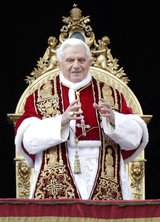Berlin, February 15, 2011
 Pope Benedict XVI.
Pope Benedict XVI.
More than 140 Catholic theologians from Germany, Austria and Switzerland this month published an open declaration to the church, urging officials to phase out the celibacy requirement for priests and implement other drastic reforms, such as ordaining women, allowing divorce and recognizing same-sex couples.
With more than 1 billion adherents, the Catholic Church has made significant gains in recent years in Asia, Africa and South America, but has been losing followers in the industrialized West, its longtime source of social, financial and political support.
“2011 must be a year of departure for the church,” said the declaration, published in the German daily newspaper Sueddeutsche Zeitung on Feb. 3. “We consider it our responsibility to contribute to a true new beginning.”
Signed by 143 theologians when it was first published, the number of signatories has grown to 224, and the initiative continues to gain momentum. It marks the strongest appeal yet to church officials to implement significant reform, say theologians.
“We want an open discussion,” said Rainer Kampling, a Catholic theology professor at Berlin’s Free University and one of the signatories. “This is an invitation for dialogue, not a break from the church.”
In response to the declaration, the German Bishops’ Conference said in a statement that it recognizes the need to address the church‘s underlying problems, but it didn’t elaborate.
Though lacking any decision-making power in the Vatican, theologians enjoy significant influence in church thought and generally are held in high regard, especially in the universities and seminaries where church doctrine is taught.
Some theologians, such as Manfred Hauke of the Faculty of Theology in Lugano, Switzerland, disagree with the declaration’s proposals.
“These theologians are demanding changes that have already been implemented in liberal Protestant denominations, so they should just convert,” he said. “They’re not bringing about change. They are departing from the Catholic faith.”
Still, backers of the declaration say that ending celibacy could serve as one solution to the problems plaguing the church in Europe: Germany is facing a major shortage of priests, and German bishops estimate about two-thirds of the country’s parishes will lack clergymen by 2020.
The situation in Austria and Switzerland is equally dire.
“We’re not saying that celibacy isn’t valuable,” said theologian Martina Blasberg-Kuhnke, vice president of the University of Osnabruck in Germany. “But what we have seen is that young men who want to be priests turn away from the profession because of the celibacy requirement.”
Pastor Klemens Armbruster of Freiburg, Germany, said attitudes toward the priesthood have changed dramatically since he was ordained in 1988: “Today, I see that both directly and indirectly I have to justify why I’m a priest, why I’m celibate.”
Pope Benedict XVI has not commented on the topic. But a recently released document dating from 1970 revealed that when he was a young priest, he signed a memorandum calling on the church to seriously examine the policy of celibacy. Then, the church also faced a shrinking number of priests.
The priest shortages also come as many Catholics in Germany, Austria and Switzerland are formally breaking ties with the church.
In 2009, 123,681 German Catholics left the church, according to church figures. Initial estimates for 2010 indicate a dramatic increase in dropout rates: In the Augsburg Diocese alone, 11,351 members cut their ties to the church last year, compared with 6,921 in 2009. Germany has an estimated 25 million Catholics.
In many European countries in which parishioners pay a church tax, financial reasons play a role in attrition. But theologians credit the rising rate to the sex-abuse scandals.
“There is no doubt that the explosion of people leaving the church was one of the most visible consequences of the [abuse scandals],” said Rudolf Hofer, a professor at the University of Graz in Austria and also a signatory.
Last year, a series of sex-abuse allegations rocked Germany‘s Catholic Church, unleashing a wave of cases across the country that led to revelations of abuse in other parts of Europe as well. It sparked a fierce public debate over Catholicism and embarrassed the church leadership in the pope’s native country.
“It’s really wounded the German church very severely,” said Mathew Schmalz, a religion professor at the College of the Holy Cross in Worcester, Mass., and a specialist on the Catholic Church. “It’s not just your ordinary crisis. It really cuts to the heart of what it means to be a Catholic.”
Some are trying to tackle the problem by reaching out to the community. Michael Dederichs, pastor of the St. Antonius Church in Dusseldorf, Germany, hangs large billboards on his church tower with encouraging messages such as “Our doors are always open.” He sends parishioners to talk with former Catholics. “Each year, we usually have about 30 to 40 people come back,” he said.
Meanwhile, some doubt the church can change. “We’ve seen all this before. There are always these movements,” said Norbert Denef, who was abused by Catholic priests as a boy in Germany and serves as a victims advocate. “The church is hierarchical, and that hasn’t changed in 2,000 years. The church isn’t able to reform.”
Yet Mr. Schmalz and others from the College of the Holy Cross say the size and depth of the crisis could push the church to redefine itself: “I think the way in which this scandal is moving — it has moved to Europe, so it shows it is not just an American problem — will force the Catholic Church to change in substantial ways while trying to stay true to its core mission.”
